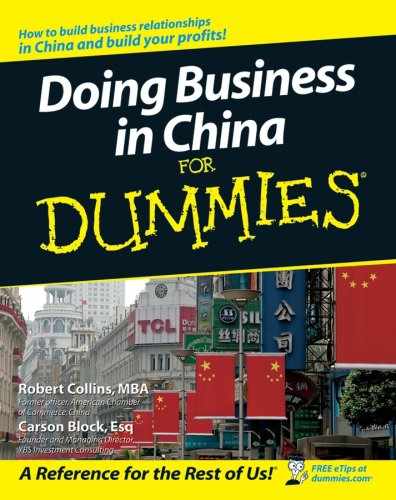Combating Corruption
Corruption isn’t nearly as pervasive in China as many in the West portray it to be. However, as in any other country, it does exist. The Chinese government even recognizes this fact. As in many countries in the world, it’s been going on for a long time.
The good news is that China’s leaders are working hard to decrease the amount of bad stuff that happens around shady business dealings by dismissing even high-ranking officials suspected of behaving inappropriately. Unfortunately, there’s a lot more work to be done.
No matter how your competitors act or how disadvantaged you feel, make sure you play by the rules. Keep in mind that in addition to breaking Chinese law, you may be breaking your home country’s laws any time you get caught up in corrupt practices. In this section, we discuss bribery and how to avoid it.
Understanding bribery laws
For most people, there’s no safe haven for violating another country’s anti-corruption laws. The U.S., for instance, enacted the Foreign Corrupt Practices Act (FCPA), which applies to U.S. persons and companies as well as those doing business in the U.S. If you’re not based in the U.S., your home country probably has a similar law. The gist of the FCPA is that if your company (or you as an individual) attempts — even unsuccessfully — to bribe an official of another country, you can face significant fines and/or jail time.
The FCPA and similar laws impose a duty to perform due diligence on third (nongovernmental) parties to ensure that they’re not engaged in corruption, either. In other words, if your partner is making payments that you’re unaware of, you may be in violation of the law if you didn’t make an effort to know about your partner’s business practices. You also can’t get cute and try to “pay” a consultant who’s then going to bribe somebody on your behalf.
The FCPA is concerned with acts that are illegal according to the particular foreign country’s written laws. If a law isn’t enforced in that country, it doesn’t matter — whatever’s on the books constitutes a violation of the FCPA.

Keeping government relationships straight
The idea that you can’t bribe officials sounds like common sense. But what about special treatment, dinners, gifts, or other things that you may not intend as a bribe but can be viewed as one? And what about employees who are Communist Party members who have relatives who are “officials”? As you can see, China has some special characteristics that make keeping clear on what may or may not be a bribe — and who all the players are — a little harder.
For one thing, your company may be dealing with companies that are partially or wholly state owned. That setup can make employees of those companies “government officials” for purposes of the FCPA and similar laws (see the preceding section for info on law). Also, officials often have family members in business. Regulators may consider these businesspeople to be officials. Under a very broad (but not implausible) interpretation, anybody who’s a member of the Communist Party may be considered an official — and there are millions of them.
As soon as you’re dealing with an “official,” any kickback or other improper benefit would violate the law. But more subtle items, such as entertainment or paying for a business trip for these people, can also run afoul of the law. Be aware of the risk of giving such items. (For advice on giving gifts to your business partners, see Chapter 16.)

Training for compliance
The most important part of a compliance program is educating all employees. Chinese staff should receive Chinese language instruction. If you have people who’re experienced working in your home operation involved in China, they can set a cultural tone of compliance and ethics.
Beyond education, you should have monitoring systems in place. Make sure that money is properly accounted for. Official receipts in China (called fa piao) often aren’t very descriptive of the services or products received. When dealing with consultants or agents, seek to get details on what they spent your money on. You can also perform background checks on suppliers and consultants to ensure that they’re operating on the up and up.
If your company’s China operation runs afoul of the FCPA or similar laws, regulators usually take into consideration how much effort your company made to prevent and monitor violations.

Managing donations responsibly
Being a solid corporate citizen in China may entail making donations or grants to the local community. Make sure that all the employees involved in making donations understand FCPA issues.
In many cases, your company donates to a government-run organization. Make sure you give no appearance of quid pro quo in making such a donation (for example, help our hospital, and your company will get a government contract).
If you’re making a good-sized donation, have the recipient sign a donation agreement. The donation agreement should be very specific as to the permitted uses of the donation. It should also require that the recipient submit detailed records of expenditures to your company and give your company the right to inspect and audit.

